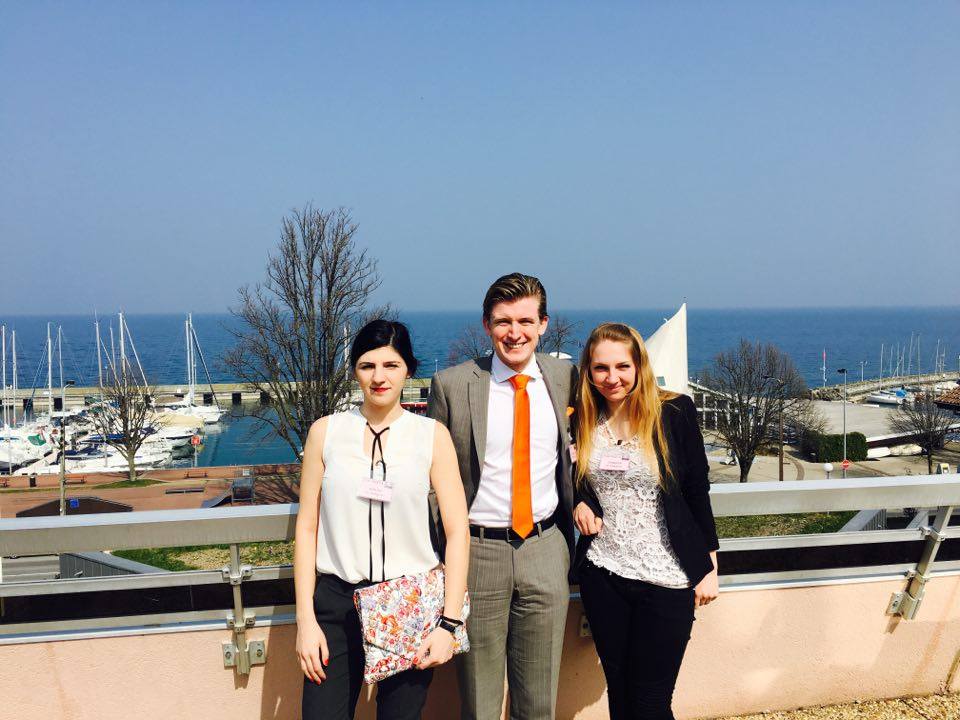The 28th Jean Pictet International Humanitarian Law Competition was held on 19 - 25 March. Jenny Farr and Miruna Terciu, both studying for the LLM in International Law, and Connor McBain represented the University of Glasgow at the event. Connor, a student on the accelerated LLB programme, shares his experience of the Pictet competition below: Colleagues of Jean Pictet, a former jurist and Vice-President of the International Committee of the Red Cross/Crescent (ICRC), founded the competition in 1989. Pictet was an immense figure in International Humanitarian Law (alternatively known as the law of armed conflict), having helped draft the four 1949 Geneva Conventions and individually authoring their resultant commentaries. The 28th edition of the competition began with the written qualification round. We submitted our final written piece in December, and received notification we had been invited to compete in the international round of the competition in Evian-les-Baines (France) and Geneva in January.
The Pictet is unlike other competitions in that there is no fixed problem to prepare in advance. This made preparing for the competition particularly difficult as we could not develop a narrow expertise based on one factual scenario. However, after two months of preparation, our team arrived in Evian well prepared, but still not quite knowing what to expect. It was to be a recurrent theme throughout the week.
At the opening ceremony, teams were invited to socialise with one another, sharing gifts, drink and food from their culture with other teams. The Argentinians brought fine wine, the Swiss excellent chocolate, and our own contribution of whisky and shortbread endeared us to some of our newfound colleagues. Some teams left before midnight, the Glasgow team included. Other teams, however, enjoyed themselves for a few more hours, courtesy of the food and beverages left behind by those who had departed early.
The practice round the next day went relatively smoothly. We were issued the ‘problem’ and given approximately 45 minutes to prepare for a test that went for 30 minutes. With this, we discovered the format for a majority of the competition. Tasks were designed to test our knowledge and responsiveness by providing short preparation periods (the length of which depended on the complexity of the test) and the corresponding test length was then dependent on whether we were being assessed on our own or based on our interactions with other teams.
The competitive rounds started in much the same fashion. Early on the first day, we were issued with a much lengthier factual scenario that was to underpin every test we were to complete. Finally… we thought to ourselves… something concrete to work with. We were mistaken, however, as each test would add new factual information building on what information we already possessed. This pattern continued for four days of hard competition, with two or three tests each day. It was a challenging, but rewarding experience. The highlight for the Glasgow team was probably the final test, at the ICRC’s Geneva headquarters, where we had to provide legal advice to a panel advising the President of the ICRC. As a team, this was our strongest showing, with only the University of New South Wales (UNSW) out performing us out of ten teams.
The semi-finalists were announced on the fourth evening of the competition. We were, rather unluckily, eliminated at this stage of the competition along with NYU, the Sorbonne and host of other strong universities with seasoned experience of the Pictet. The eventual final, to be judged by President Theodor Meron (of the UN Appeals Mechanism), included UNSW, the Geneva Academy of International Humanitarian Law and Human Rights, and the University of Grenoble. Each side performed well, with the Geneva Academy walking out as deserved winners. I was nominated for the Gilbert Apolis Speaking Prize, but rightly lost out to the lead advocate from UNSW, who had been excellent in the preliminary rounds as well as the semi-final.
The Pictet has attracted over 3000 competitors in its history, with one third of those (according to investigations by the organising committee) going on to work in humanitarian law or human rights law. Drawing on the wealth of experience of the organising committee, the learning experience gained at the Pictet is probably the closest understanding and appreciation for IHL fieldwork one can gain while still at university. We seriously recommend it to anyone with aspirations in this field.
Our thanks go to Robin Geiss, who always provided counsel and motivation during the course of the process. Our chances of qualification would have been dubious without his support. Our thanks must also go to Stephen Bogle, in his capacity as Mooting Director, for covering part of the entrance fee. It was a privilege to be part of Glasgow’s first foray into this competition, and we hope others will make use of the opportunity to do so.
~ Connor McBain
